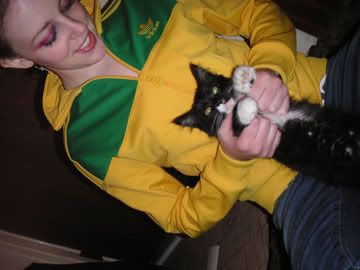Now it's time for some ruminations. Why did I enjoy The Martian Chronicles so much? Sure, it's speculative, but it's realistic also. It's definitely a parable for what we do to each other and our planet. The novel traces Mankind's conquering of Mars:
1. We explored Mars, surprised to find a sophisticated civilization
2. We inadvertently killed the native population with a common illness
3. We destroyed what the Martians had so carefully crafted: their strong buildings, their logical faith, and their unique knowledge
4. We covered Mars with ill-fabricated edifices and urban sprawl as we colonized there
5. We fled Mars when we thought Earth needed us
6. Then we blew up Earth in a nuclear war, leaving two battered planets to waste, save for a slice of our population
So #5 and 6 haven't yet happened; but they're entirely likely, or something like them. Look at what I've outlined above; this is history repeating itself. It's manifest destiny, Mars-style (hmm, that'd be a good TV show—or US policy).
That is why I think this book is so badass. Bradbury moves humans to a new planet, and we fuck it up. It seems realistic to me!
The novel is really a series of short stories, taking place from January 1999 to October 2026. Of course they're connected; we see some characters recur throughout. But taken separately, each story makes its own point. All together, it sums up man's folly.
There's plenty of futurist speculation and pointed social satire. I think I've said enough to bait you into reading it, so I won't go into the specifics about each story, or about the character. I leave you with this tantalizing tidbit (64):
"... Well, these Martians have art and religion and everything."Spender, the shooter of five crewmates while on Mars, was disturbed by the others' treatment of Martian artifacts; he compares their actions to his parents' (and Americans in general) while in a foreign locale. Spender, in his exploration of Mars, realizes the Martians had discovered the meaning of life (67):
"You think that they knew it was all about, do you?"
"For my money."
"And for that reason you started shooting people."
"When I was a kid my folks took me to visit Mexico City. I'll always remember the way my father acted—loud and big. And my mother didn't like the people because they were dark and didn't wash enough. And my sister wouldn't talk to most of them. I was the only one that really liked it. And I can see my mother and father coming to Mars and acting the same way here."
"Man had become too much man and not enough animal on Mars too. And the men of Mars realized that in order to survive they would have to forgo asking that one question any longer: Why live? Life was its own answer. Life was the propogation of more life and the living of as good a life as possible..."KK
P.S. I see that is was made into a series. BETTER WATCH! Thanks, YouTube.
